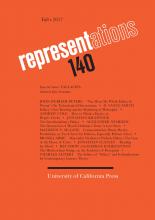NOW AVAILABLE
Number 139, Summer 2017 (read for free at UC Press)
Special Issue: FALLACIES
Where does the history of fallacies leave the contemporary critic?
 It is hard not to see that we are living in in an especially fallacious age; fallacies are evidently psychologically compelling. They appeal to our fear, anger, or pity; to our respect for authority; or to our faith in the power of numbers. A president will be blamed for an economic downturn that precedes him or credited for job growth that is inconsequent to his acts. As mistakes of logic, fallacies are not lies and not exactly nonsense either. Fallacies, in other words, are things that, not being valid, “are susceptible of being mistaken” for valid.
It is hard not to see that we are living in in an especially fallacious age; fallacies are evidently psychologically compelling. They appeal to our fear, anger, or pity; to our respect for authority; or to our faith in the power of numbers. A president will be blamed for an economic downturn that precedes him or credited for job growth that is inconsequent to his acts. As mistakes of logic, fallacies are not lies and not exactly nonsense either. Fallacies, in other words, are things that, not being valid, “are susceptible of being mistaken” for valid.
In this collection of essays, eleven scholars of literature, logic, philosophy, film, and art history take up a variety of ways in which, in our disciplines and critical practices, truth appears. The essays, in explaining a few of the well-known fallacies and naming others, are all concerned with ways of reading that bring ideas and experiences to a subject that are not germane to the subject. They ask us to look, as I. A. Richards does, at “instances of irrelevance” in thinking, at what fits and doesn’t fit or is there by accident. They raise our awareness of those “inadequate” revelations that W. K. Wimsatt and Monroe Beardsley, in their famous essay on the intentional fallacy, tried to arm us against and exclude from critical judgment “like lumps from pudding and ‘bugs’ from machinery.”
To return to the question of fallacies in the twenty-first century is to ask what is most material to our arguments if we want them to be practical and satisfying and if, in Beardsley’s words, “we wish to get out of them what is most worth getting.”
Introduction: The Issue with Fallacies
Elisa Tamarkin
“You Mean My Whole Fallacy Is Wrong”: On Technological Determinism
John Durham Peters
Fallacy: Close Reading and the Beginning of Philosophy
D. Vance Smith
How to Think a Figure; or, Hegel’s Circles
Andrew Cole
The Interdisciplinary Fallacy
Jonathan Kramnick
The Destruction of Hood’s Ordnance Train: A Love Story
Alexander Nemerov
Compositionism: Plants, Poetics, Possibilities; or, Two Cheers for Fallacies, Especially Pathetic Ones!
Maureen N. McLane
Materialist Vitalism or Pathetic Fallacy: The Case of the House of Usher
Branka Arsić
Reading for Mood
Jonathan Flatley
The Hitchcockian Nudge; or, An Aesthetics of Deception
Rey Chow, Markos Hadjioannou
The Fallacy of “Fallacy” and Its Implications for Contemporary Literary Theory
Charles Altieri


 JONATHAN KRAMNICK
JONATHAN KRAMNICK It is hard not to see that we are living in in an especially fallacious age; fallacies are evidently psychologically compelling. They appeal to our fear, anger, or pity; to our respect for authority; or to our faith in the power of numbers. A president will be blamed for an economic downturn that precedes him or credited for job growth that is inconsequent to his acts. As mistakes of logic, fallacies are not lies and not exactly nonsense either. Fallacies, in other words, are things that, not being valid, “are susceptible of being mistaken” for valid.
It is hard not to see that we are living in in an especially fallacious age; fallacies are evidently psychologically compelling. They appeal to our fear, anger, or pity; to our respect for authority; or to our faith in the power of numbers. A president will be blamed for an economic downturn that precedes him or credited for job growth that is inconsequent to his acts. As mistakes of logic, fallacies are not lies and not exactly nonsense either. Fallacies, in other words, are things that, not being valid, “are susceptible of being mistaken” for valid.